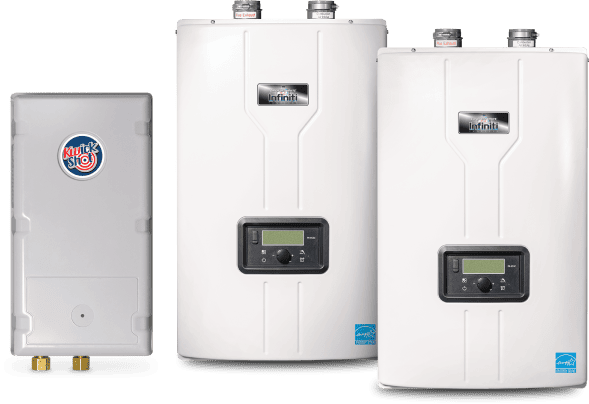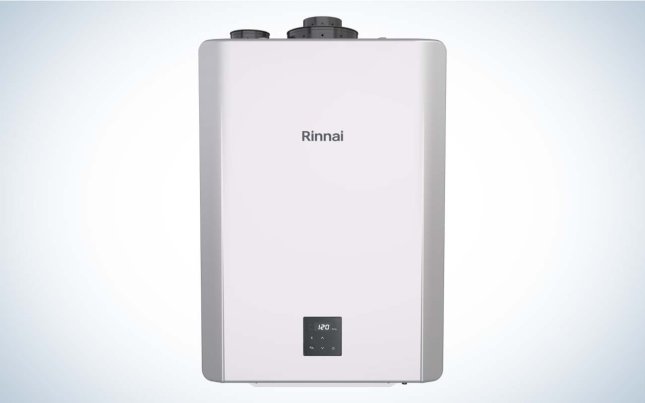From Energy Savings To Space Efficiency: The Benefits Of Tankless Water Heaters
From Energy Savings To Space Efficiency: The Benefits Of Tankless Water Heaters
Blog Article
We've found this post involving Unveiling the Hot Trend: The Benefits of Tankless Water down the page on the net and believe it made good sense to quickly share it with you on this site.

In a globe where ease and performance preponderate, it's no surprise that property owners are continuously in search of smarter methods to handle their home's energy usage and convenience. One technology that has continuously acquired appeal is the tankless hot water heater. But what exactly makes these systems stick out from the standard tank-based versions most of us matured with? Allow's dive in and discover the benefits of tankless hot water heater, helping you decide if it's time to make the switch in your house.
Introduction
Picture this: you enter the shower after a long day, expecting a calming cascade of warm water, only to be greeted by icy droplets since the last individual used everything up. Sound acquainted? Standard water heaters store a set amount of warm water, meaning you go to the mercy of that container's supply. Tankless systems, on the other hand, warm water as needed. No more going out mid-shower, no more fumbling with schedules simply to ensure hot water is available.
Comprehending Tankless Water Heaters
What Are Tankless Hot Water Heater?
Tankless hot water heater, often known as on-demand or instantaneous hot water heater, provide warm water only as it's required. Rather than keeping gallons of pre-heated water, these units kick right into action the moment you switch on the faucet. Water passes through a warm exchanger, heating up in real-time, indicating you get a nonstop flow of hot water without the need for a huge storage tank resting lazily by.
Exactly how Do They Differ from Typical Systems?
Typical heating systems hold a tank of warm water, using power to maintain that storage tank at a regular temperature level. Tankless devices eliminate the standing supply, minimizing squandered energy and the bulky footprint of a huge cylinder. Essentially, you're updating from a "stockpile" way of thinking to a "made-to-order" strategy.
Usual Kinds Of Tankless Units
Tankless water heaters generally can be found in two ranges: gas and electrical. Gas designs often tend to provide higher circulation rates, suitable for bigger homes, while electrical designs commonly offer smaller sized homes and are normally simpler to set up. Additionally, some systems are created for point-of-use (serving one component) while others can take care of the whole home's warm water demands.
Secret Advantages of Tankless Water Heaters
Power Performance and Cost Savings
Say goodbye to heating a titan storage tank's worth of water and maintaining it warm all the time. Tankless heaters reduce standby power losses, which can lower energy bills. While the first price might be greater, the long-term financial savings commonly justify the investment.
3. Space-Saving Style
If your home is short on storage space, removing the large container liberates important area. Tankless devices are compact and can typically be installed on wall surfaces, concealed in corners, or installed in limited energy wardrobes without having all to oneself the entire room.
4. Longer Lifespan
A well-maintained tankless water heater can outlive its tank-based relative. Typical tanks may last 10-15 years, while tankless designs can maintain chugging along for twenty years or more, making them a solid investment in time.
1. Unlimited Hot Water Supply
Ever needed to arrange showers so everyone obtains their fair share of hot water? With tankless, that ends up being a thing of the past. As long as the heater's circulation capability isn't surpassed, you can take back-to-back showers without turning into a popsicle.
5. Improved Water Top Quality
Keeping water in a container can sometimes bring about sediment buildup or a somewhat "off" taste. With tankless systems, fresh water is heated on the spot, minimizing the possibilities of debris build-up and possibly offering cleaner-tasting water.
Considerations Before Switching
Though the benefits are engaging, it's smart to think about a couple of variables prior to completely dedicating.
Reviewing Your Home's Water Use Patterns
If your house simultaneously uses multiple components with high warm water demand, make sure the device's flow price satisfies your needs. Recognizing your use patterns helps you choose the right dimension and type of tankless heating system.
Maintenance and Treatment Tips
Tankless systems are relatively reduced maintenance, but they aren't set-it-and-forget-it home appliances.
Normal Cleaning and Descaling
Hard water minerals can develop in the warmth exchanger, affecting efficiency. Routine descaling (typically advised each year) maintains the device going for peak performance.
Yearly Specialist Inspections
A yearly checkup from a professional guarantees small concerns are captured early. They'll examine the system's performance, look for leaks, and help maintain optimal performance.
Preliminary Investment Costs
Tankless heating units usually come with a greater in advance price. Between the system itself and possible setup modifications, the first expense might give you sticker label shock. But keep in mind to view it as a lasting financial investment.
Installment Requirements
Depending upon your home's facilities, you could need additional electrical ability or gas line upgrades. Ensure you comprehend the installation needs and seek advice from an expert to stay clear of shocks.
Ensuring Proper Ventilation
For gas versions, proper ventilation is important to securely eliminate exhaust gases. Make sure venting systems are tidy and appropriately mounted to stop any type of prospective security risks.
Comparing Different Brands and Models
Not all tankless water heaters are created equivalent.
Investigating Trustworthy Producers
Look for trusted brand names with a background of generating high quality units. A trustworthy maker typically supplies far better client support and longer warranties.
Installment: DIY or Expert?
While some home owners relish tackling projects themselves, tankless installation may not be the most effective time to break out the toolbox.
Benefits and drawbacks of DIY Installation
A DIY set up might save money, but it includes dangers. Inaccurate setup can cause inefficiency or safety concerns. If you come in handy and have experience, it could be practical-- however wage caution.
Reading Reviews and Customer Responses
Individual reviews and feedback from neighbors or friends who have gone tankless can supply useful understandings. Sometimes, real-life experiences can be more telling than marketing brochures.
When to Call a Specialist Plumber
For the majority of, calling a pro ensures everything's done properly. A specialist plumbing comprehends neighborhood codes, sizing requirements, and venting parameters, decreasing the danger of incidents.
Taking full advantage of Performance
You've purchased a tankless system-- now maximize its effectiveness.
Ideal Temperature Settings
Most people establish their devices in between 120-140 F. Changing the temperature can boost convenience and savings. Experiment to locate a pleasant area that doesn't throw away energy.
Coupling With Low-Flow Fixtures
Want to stretch your system's abilities? Take into consideration mounting low-flow showerheads and faucets. They reduce water use, allowing your tankless system to provide a consistent stream of hot water without stressing.
Environmental Impact
Tankless water heaters straighten with greener living goals.
Minimized Carbon Footprint
By using less power and just heating water as needed, tankless systems can reduce your home's carbon impact, reducing your ecological influence.
Conserving Natural Resources
Less energy consumption and less thrown away warm water translate into fewer natural resources being used, an environmental win-win.
That Profits A Lot Of from Tankless Heating systems?
The elegance of tankless heating systems is that they can fit a range of houses.
Huge Households vs. Single Occupants
Huge households could love the endless warm water supply, while solitary residents value the energy cost savings from not heating up a whole container for simply one person's early morning shower.
Home Owners with Restricted Space
If your home is short on square video, losing the large tank maximizes area for other basics-- or maybe just extra elbow room.
Eco-Conscious Consumers
Going tankless aligns with environmentally friendly values, guaranteeing you're not throwing away energy or resources.
Future Trends in Tankless Hot Water Heater
The world of home appliances is ever-evolving, and tankless water heaters are no exception.
Developments in Innovation
R&D is frequently improving heat exchangers, making systems much more effective and resilient. Future models might be even quieter, a lot more portable, and better suited for varying climates.
Smart Home Assimilation
Imagine readjusting your hot water heater's temperature through an application or obtaining maintenance alerts on your phone. As clever home technology advances, we'll see even more connectivity and benefit.
Conclusion
Picking a tankless water heater is greater than simply upgrading your home's hot water system; it's buying long-term comfort, energy performance, and a greener way of life. By considering your home's water usage, bearing in mind installation needs, and dedicating to regular upkeep, you can appreciate a steady stream of warm water without the baggage of a large tank. As modern technology progresses, you can anticipate also smarter, much more effective tankless remedies that not only make your life simpler however likewise benefit the planet.
5 Benefits of Tankless Water Heaters
Save Valuable Space
Since tankless water heaters do not have a massive 40+ gallon tank of water, they are considerably smaller and can fit in more narrow spaces in your home.
If you are working with limited square footage, a tankless water heater will still provide you with the hot water you need while taking up significantly less space in your home. While the exact size of a tankless water heater varies depending on the brand, some are as small as a carry-on suitcase.
Endless Supply of Hot Water
While a traditional water heater preheats and stores your water in the tank, tankless water heaters do not rely on a reservoir system.
This means that they do not run out of hot water like traditional water heaters since they make hot water as needed. Traditional water heaters need to stop and reheat water when the tank inevitably runs out, but tankless water heaters do not have this issue.
Provide Warm Water On-Demand
As mentioned above, tankless water heaters do not preheat a certain amount of water and then store it in a massive tank to be used later. An advantage of installing a tankless water heater includes water being heated instantly whenever you turn on the faucet.
When you turn on the water, it will travel through a heat exchanger in the unit and be heated with either an electric element or a natural gas burner. Gone are the days of having to ration out your hot water to make sure that you do not run out.
Longer Life Cycle
Not only do tankless water heaters provide an endless supply of hot water for your home whenever you want it, but these units tend to have a longer lifespan than water heaters with tanks.
Tanked water heaters have an average lifespan of around 10 years, as the tank is prone to corrosion, leading to serious issues. In comparison, tankless water heaters can last for around 15 to 20 years with the proper maintenance and tune-ups.
Energy Efficient
Compared to traditional water heaters, tankless water heaters are a more energy-efficient water heating option for your home. Tank water heaters must heat and reheat the water stored in the tank throughout the day, even if you are not home.
This energy use adds up over time, leading to an increase in your energy bills and added strain on your unit. A benefit of buying a tankless water heater includes saving money since it only operates when you turn on the hot water. Since it only heats up as needed, this can decrease your energy bills and save you money in the long run.
https://callrandazzo.com/blog/5-benefits-of-tankless-water-heaters/

I was brought to that editorial about Unveiling the Hot Trend: The Benefits of Tankless Water through an associate on a different website. If you enjoyed reading our blog posting kindly remember to share it. Thanks for being here. Revisit us soon.
Source This Article Report this page